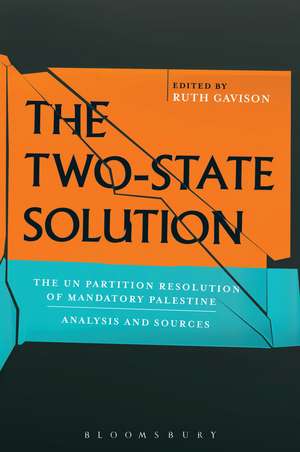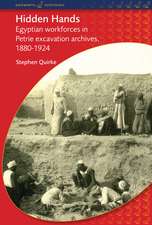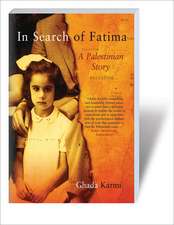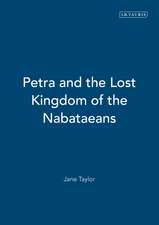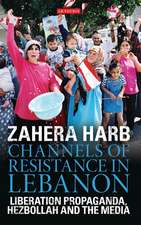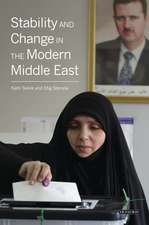The Two-State Solution: The UN Partition Resolution of Mandatory Palestine - Analysis and Sources
Editat de Dr. Ruth Gavisonen Limba Engleză Paperback – 14 aug 2013
| Toate formatele și edițiile | Preț | Express |
|---|---|---|
| Paperback (1) | 242.34 lei 6-8 săpt. | |
| Bloomsbury Publishing – 14 aug 2013 | 242.34 lei 6-8 săpt. | |
| Hardback (1) | 835.51 lei 6-8 săpt. | |
| Bloomsbury Publishing – 14 aug 2013 | 835.51 lei 6-8 săpt. |
Preț: 242.34 lei
Preț vechi: 276.07 lei
-12% Nou
Puncte Express: 364
Preț estimativ în valută:
46.39€ • 50.40$ • 38.99£
46.39€ • 50.40$ • 38.99£
Carte tipărită la comandă
Livrare economică 21 aprilie-05 mai
Preluare comenzi: 021 569.72.76
Specificații
ISBN-13: 9781623566074
ISBN-10: 162356607X
Pagini: 304
Dimensiuni: 152 x 229 x 25 mm
Greutate: 0.59 kg
Editura: Bloomsbury Publishing
Colecția Bloomsbury Academic
Locul publicării:New York, United States
ISBN-10: 162356607X
Pagini: 304
Dimensiuni: 152 x 229 x 25 mm
Greutate: 0.59 kg
Editura: Bloomsbury Publishing
Colecția Bloomsbury Academic
Locul publicării:New York, United States
Caracteristici
Provides a comprehensive account of the position of the two sides and the international community
Notă biografică
Ruth Gavison is Haim H. Cohn Professor Emerita of Human Rights in the Faculty of Law at the Hebrew University of Jerusalem, Israel and the Founding President of Metzilah, a center for Zionist, Jewish, Humanist, and Liberal Tought. She has written extensively on human rights, Israeli society, and Israel as a Jewish and democratic state. She served as a member of the Winograd Commission, which investigated the 2nd Lebanon War (Sept. 2006- Jan. 2008).
Cuprins
IntroductionRuth GavisonPart I. The Partition Resolution1. The Zionist Debates on Partition (1919-1947)Itzhak Galnoor 2. The Positions in Support of the Partition PlanAlexander Yakobson3. Palestinians and the Partition PlanMustafa Kabba4. The Position of the Arab Representation vis-à-vis the Partition Plan: The Crime and Its PunishmentNazier Magally5. The November 29th Resolution: Then and Now Ruth GavisonPart II. Sources First Crossroads: Peel Commission, 1937 Second Crossroads: The Anglo-American Inquiry Commission, March-April 1946Third Crossroads: UNSCOP - Establishment, Efforts, and Recommendations, May-September 1947Fourth Crossroads: United Nations Resolution, November 29th, 1947Fifth Crossroads: Following the Resolution
Recenzii
This rich and insightful book combines a historical-political analysis of the Partition Resolution and of its ensuing consequences with an evaluation of its enduring relevance. The book offers illuminating insights by Jewish and Palestinian scholars who virtually bring to life the intense debates within both communities about the idea of partitioning Palestine/Eretz Yisrael and specifically the Partition Plan. The contributions are complemented by an extraordinary rich collection of sources that shed comprehensive light on the discussions that led to the decisions that shaped the evolution of the struggle for statehood in Palestine/Eretz Yisrael. Despite the very many years that elapsed since, these debates and decisions, and their consequences, still resonate. They are still pertinent to understanding the conflict and the possibilities for its resolution. This book provides an invaluable and indispensable key to the understanding of the history of Zionism, the struggle in Palestine/Eretz Yisrael and its ultimate resolution.
Ruth Gavison and her colleagues have directed attention to the historical, political and fundamental moral issues of the origins of United Nations General Assembly Resolution 181 of 29 November 1947, generally referred to as the UN Partition Resolution. Whether or not there is in fact a decline in the level of Israeli (and Palestinian) intellectual and moral acuity in addressing such existential concerns as were faced in the lead-up to1947, the overall result achieved in this instance is an eminently readable volume which is as stimulating, perplexing and challenging for an open-minded reader as the conflict itself.
Ruth Gavison and her colleagues have directed attention to the historical, political and fundamental moral issues of the origins of United Nations General Assembly Resolution 181 of 29 November 1947, generally referred to as the UN Partition Resolution. Whether or not there is in fact a decline in the level of Israeli (and Palestinian) intellectual and moral acuity in addressing such existential concerns as were faced in the lead-up to1947, the overall result achieved in this instance is an eminently readable volume which is as stimulating, perplexing and challenging for an open-minded reader as the conflict itself.
